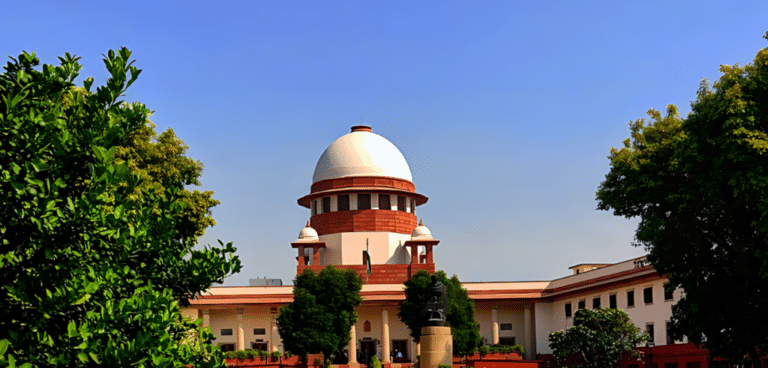About Constitution Bench of the Supreme Court
- Generally, most of the cases before the SC are heard by a division bench (2 or 3 judge members).
- If a case is likely to have a larger national impact or it is likely to decide the law for good, a constitution bench is formed.
- Constitution bench gives an overarching view on a question of law and defines a path the law will take in the future.
- Article 145(3) of the Constitution makes it clear. It says “any case involving a substantial question of law as to the interpretation of the Constitution” must be decided by a Bench of at least five judges.
- In India, these benches are temporary and are dissolved once a legal question or issue is settled.
- Size:
- It will have five or more judges of the SC.
- A larger bench is constituted either depending on the importanceof the issueor if there is a need to review the judgment of a smaller bench.
- For instance, a seven-judge bench is constituted if a need is felt to review the judgment of a five-judge bench.
- To date, the largest-ever Constitution Bench was that of 13 judges in the case Kesavananda Bharati v. State of Kerala. The Kesavananda Bharati judgment, delivered on 24 April 1973, in a historic 7:6 majority decision, propounded the basic structure doctrine of the Constitution, which holds that certain fundamental features of the Constitution cannot be amended by parliament.
Who forms the Constitution bench and when?
- The Chief Justice of India has the power to set up a Constitution bench, and he is the one who refers cases to it.
- Currently, there are four situations when such a bench can be formed.
- First, if a case involves a “substantial question of law” related to the interpretation of the Constitution.
- Second, a bench can be formed if the President seeks SC’s opinion on a law or fact. In this case, however, the apex court’s decision is not binding on the President, and they can take a different point of view.
- Third, a Constitution bench can be formed when a two-judge bench and later a three-judge bench deliver conflicting judgements on the same issue.
- Lastly, it can be formed if a three-judge bench delivers a judgement that is different from the judgement delivered by a previous three-judge bench on an issue.
Q1: What is Judicial Review?
Judicial review is the power bestowed upon the judiciary by the constitution, by virtue of which the judiciary can examine legislative enactments and executive orders of the governments, be it state or central. It is the Constitution of India itself that grants such power to the judiciary in India. The right to judicial review is possessed by both the supreme courts and the high courts of the country.The courts have the power to declare any law passed by the legislature as null and void if the law goes against the constitution upon which the law cannot be imposed by the government.
Source: SC mulls having sign language interpreter during Constitution bench hearings
Last updated on March, 2026
→ UPSC Notification 2026 is now out on the official website at upsconline.nic.in.
→ UPSC IFoS Notification 2026 is now out on the official website at upsconline.nic.in.
→ UPSC Calendar 2026 has been released.
→ UPSC Final Result 2025 is expected to be released soon.
→ Check out the latest UPSC Syllabus 2026 here.
→ Join Vajiram & Ravi’s Interview Guidance Programme for expert help to crack your final UPSC stage.
→ UPSC Mains Result 2025 is now out.
→ UPSC Prelims 2026 will be conducted on 24th May, 2026 & UPSC Mains 2026 will be conducted on 21st August 2026.
→ The UPSC Selection Process is of 3 stages-Prelims, Mains and Interview.
→ Prepare effectively with Vajiram & Ravi’s UPSC Prelims Test Series 2026 featuring full-length mock tests, detailed solutions, and performance analysis.
→ Enroll in Vajiram & Ravi’s UPSC Mains Test Series 2026 for structured answer writing practice, expert evaluation, and exam-oriented feedback.
→ Join Vajiram & Ravi’s Best UPSC Mentorship Program for personalized guidance, strategy planning, and one-to-one support from experienced mentors.
→ Check UPSC Marksheet 2024 Here.
→ UPSC Toppers List 2024 is released now. Shakti Dubey is UPSC AIR 1 2024 Topper.
→ Also check Best UPSC Coaching in India


















